This post may contain affiliate links. Please see our disclosure policy.
Canning apricots is one of my favorite ways to preserve apricots and enjoy them all year round. Whether you’re adding them to baked goods, spooning them over ice cream, or enjoying them straight from the jar, canned apricots make a sweet treat that will brighten up your winter pantry.
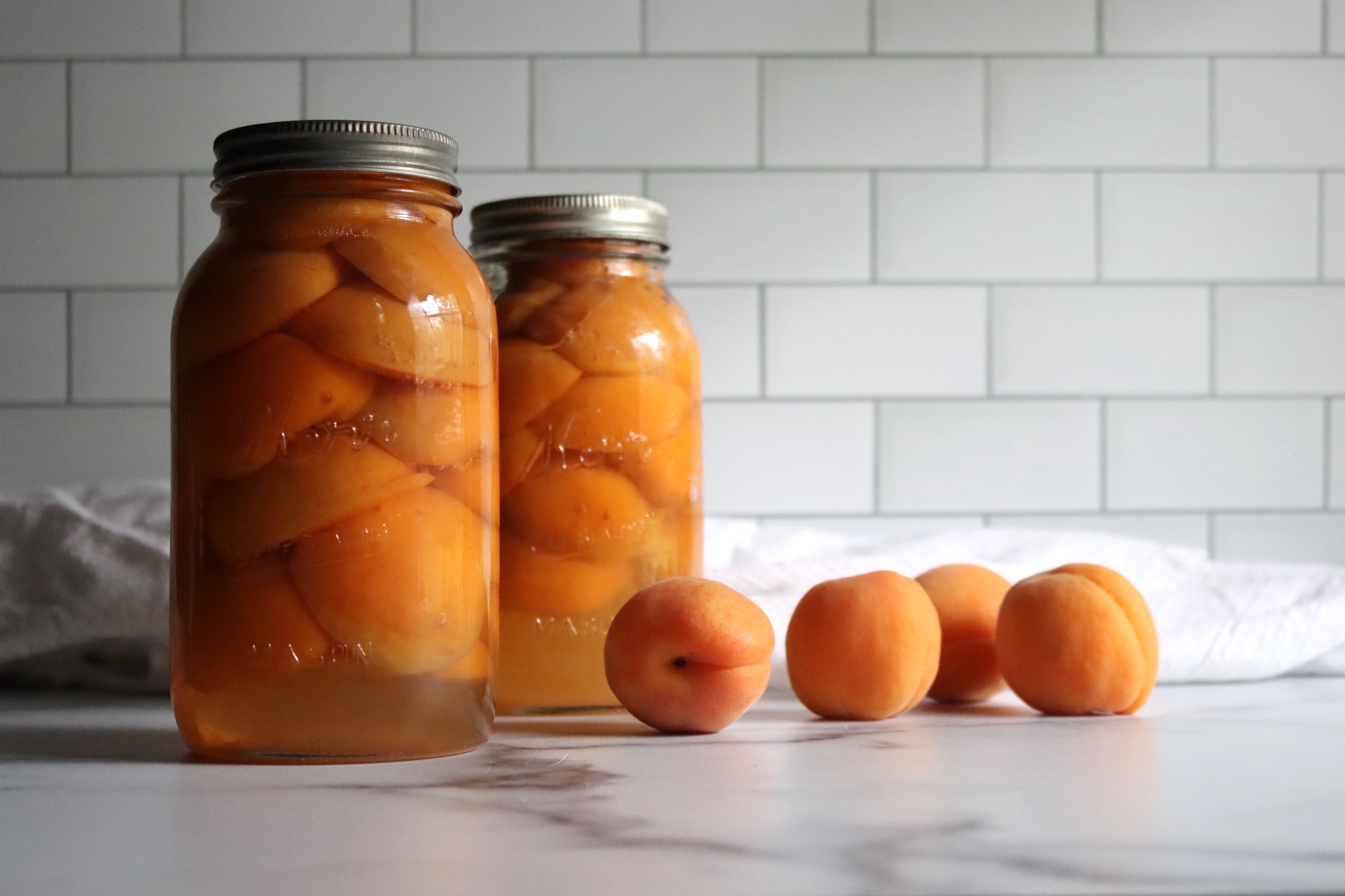
Table of Contents
Growing up in California, we always had fresh apricots by the truckload. Just one or two backyard trees are enough to provide for the whole neighborhood. The problem is, their season is short, and once they’re gone, you’ve got to wait a whole year to taste them again.
My mom still has a backyard apricot tree, and this past year, I developed easy apricot canning recipes to help her, including apricot jam and apricot butter, since she’s not exactly an experienced canner. She needed something simple, and those recipes were perfect for her…but you can only eat so much jam. (Canning apricot pie filling is also delicious, but it’s a bit more involved.)
Canning plain apricots in syrup is a lot more versatile, so I tried out all of the tested methods to find the very best option for canning apricots. It had to be easy, but more importantly, it had to produce the best quality fruit.
What’s the point in preserving something if it’s not worth using?
After trying out all the methods, I found the very best method is raw pack canning apricots in light syrup, with the peels intact, in a water bath canner.
There are tested options for pressure canning, hot pack canning, and peeled apricots. None of them turn out nearly as good.
The problem is, apricots are a delicate fruit, and they fall apart in canning when peeled or hot packed. Similarly, pressure canning is a bit much for them.
But what happens to be the best method is also the simplest. All you need cut the fruit in half, pack them in jars (cut side down), and them pour syrup over them before canning.
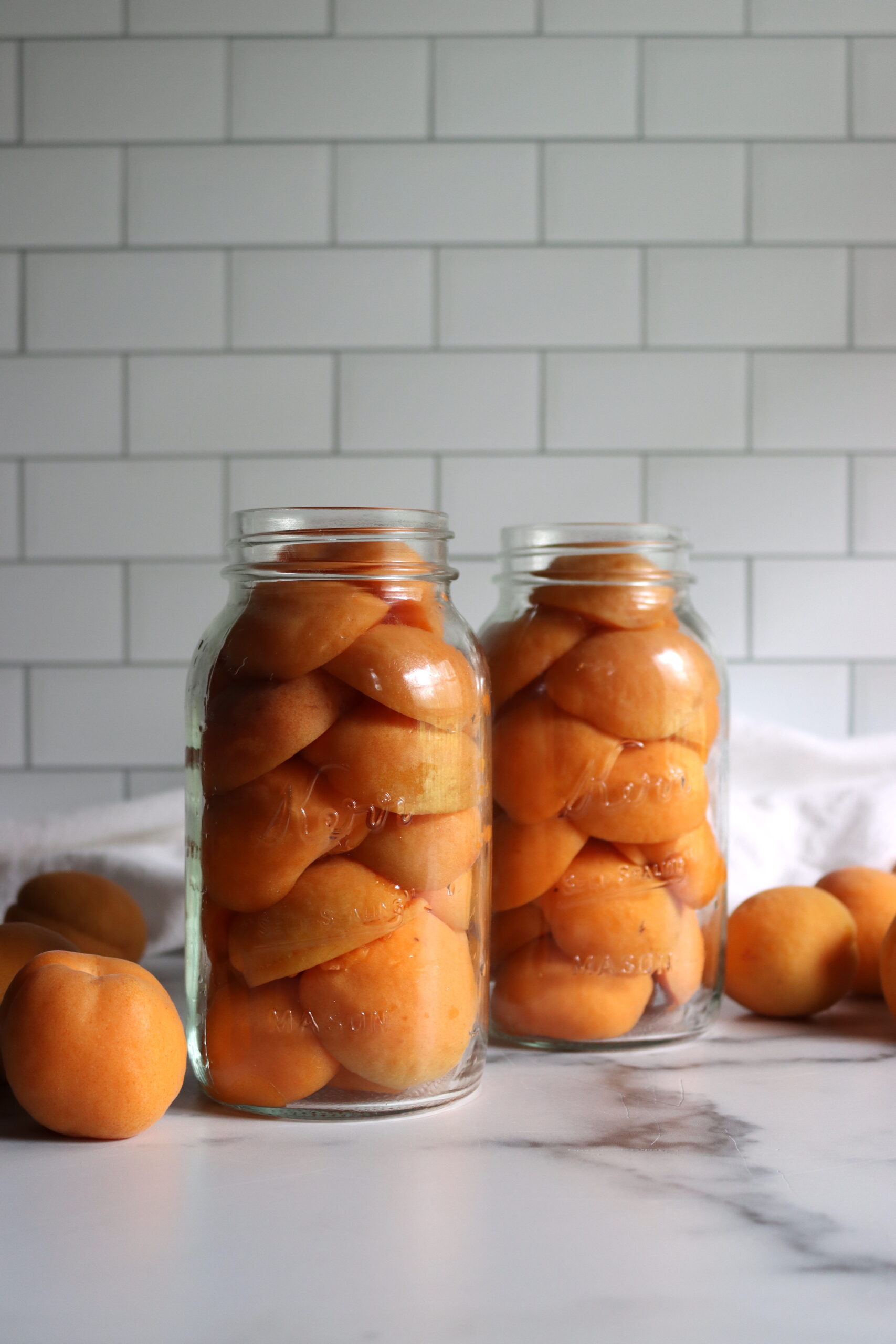
What You’ll Need to Can Apricots
Before you begin, gather these essential supplies:
- Fresh apricots (firm, ripe, and unblemished)
- Canning jars (pint or quart-sized)
- Lids and bands (for sealing jars)
- Large pot (for sterilizing jars and making syrup)
- Jar lifter (for handling hot jars)
- Canning funnel (for easy pouring)
- Clean towels (for wiping jar rims)
What Type of Apricots Are Best for Canning?
When selecting apricots for canning, choose fruit that is ripe but not overly soft. The most commonly used apricot varieties for canning include:
- Blenheim apricots: Known for their sweet, rich flavor, these apricots are a favorite for canning.
- Tilton apricots: Slightly firmer than Blenheim, Tiltons are a great choice for preserving, holding their shape well during processing.
- Royal apricots: These are sweet and juicy, with a perfect balance of tartness, making them ideal for a variety of recipes.
Regardless of the variety, make sure the apricots are free of blemishes or bruising, as these can affect the quality of the final canned product.
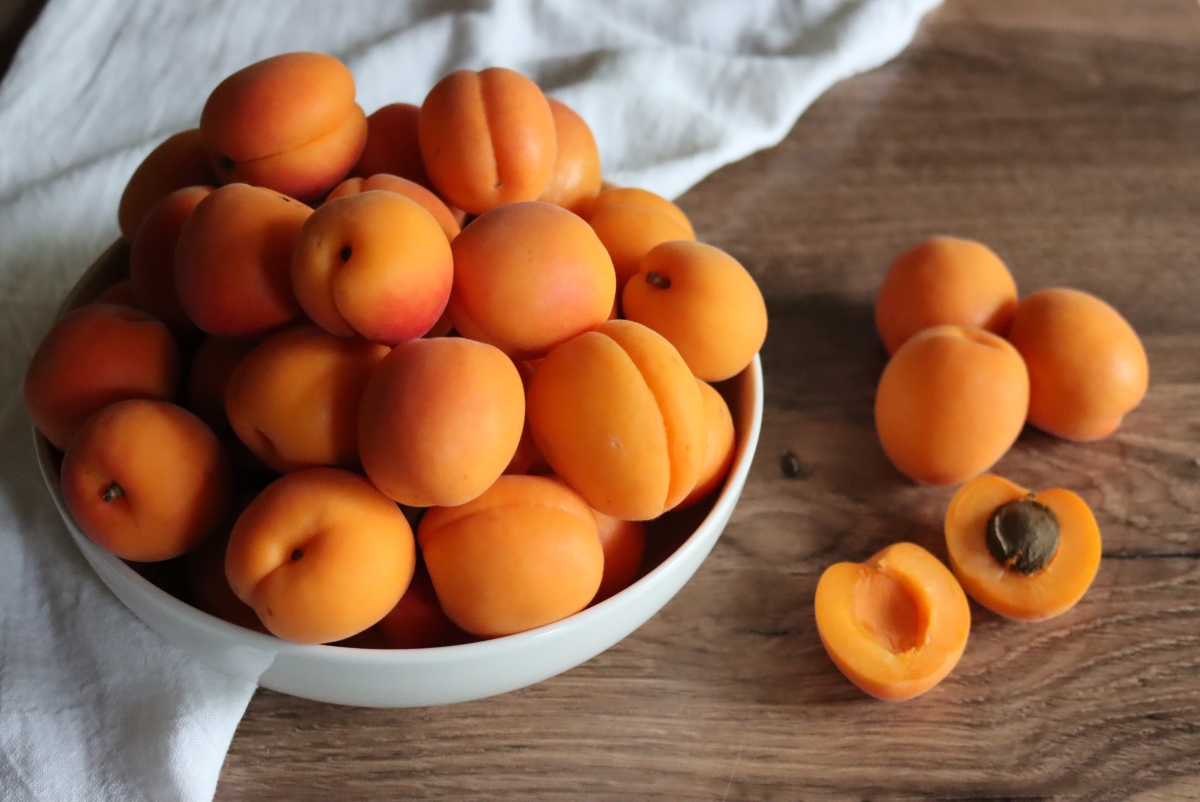
How to Can Apricots (Raw Pack)
Start by washing the apricots thoroughly under cool water to remove any dirt or debris. Next, you’ll need to halve the apricots and remove the pits.
If you prefer, you can also peel the apricots by blanching them in hot water for about 30 seconds, then placing them in an ice bath to make peeling easier. However, the skin is perfectly edible and will soften during the canning process, so peeling is optional.
The fruit fall apart and start to brown when peeled, even when treated with lemon juice. They’re not going to look good if you peel them. (Below, you’ll see the best I could do, with a lot of prep. They’re doing ok thus far, but once they go into the jar they fell apart. I strongly recommend leaving the peels on and raw packin.)
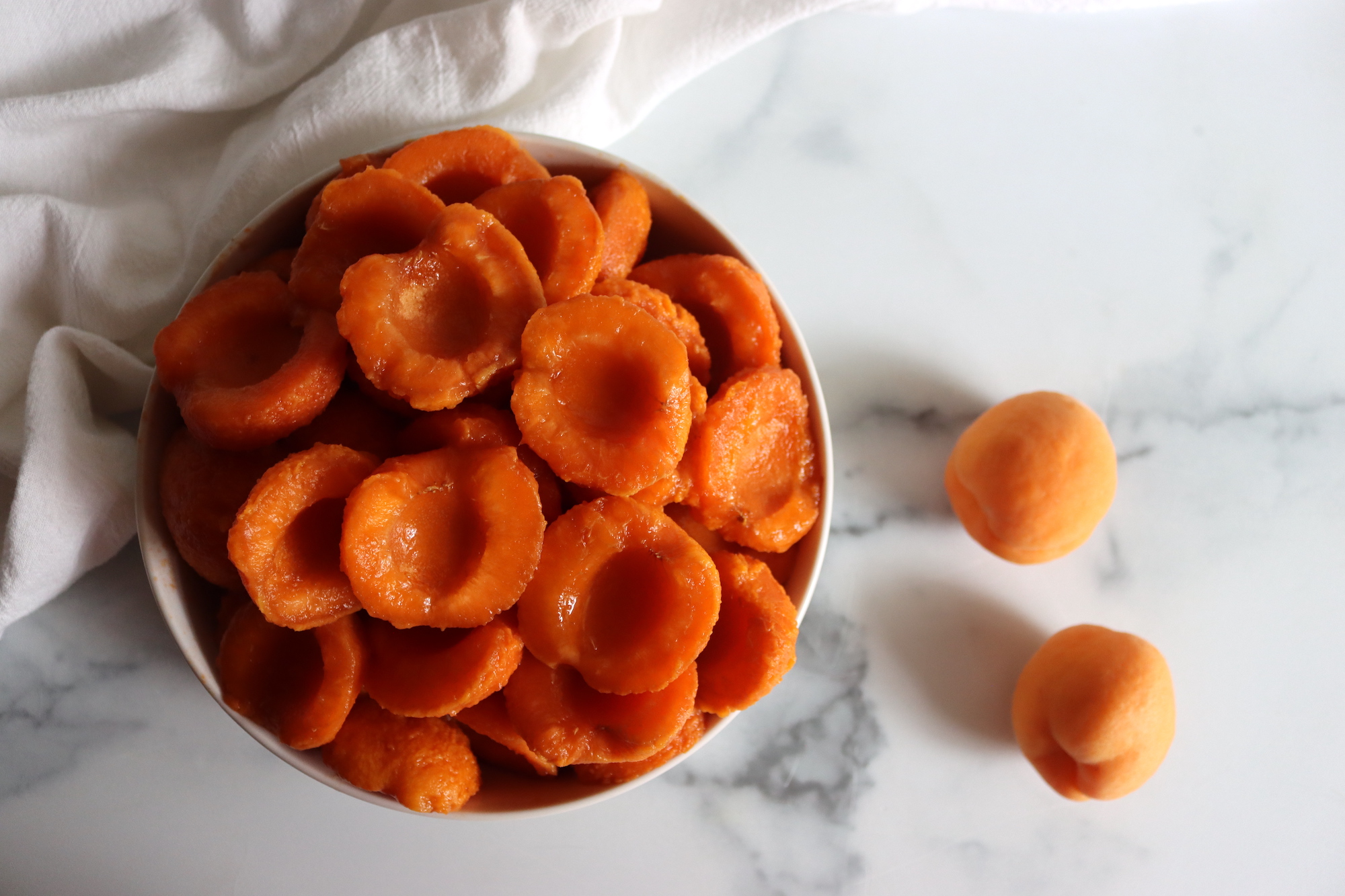
Once pitted and halved, you may choose to treat your apricots with ascorbic acid (lemon juice or citric acid) to prevent browning, especially if you’re using lighter-colored apricots.
I actually found that when halved and pitted quickly, I could skip the treatment and just pack them right into the jars, and they didn’t brown. This is really going to depend on the apricot variety, and some brown quicker than others.
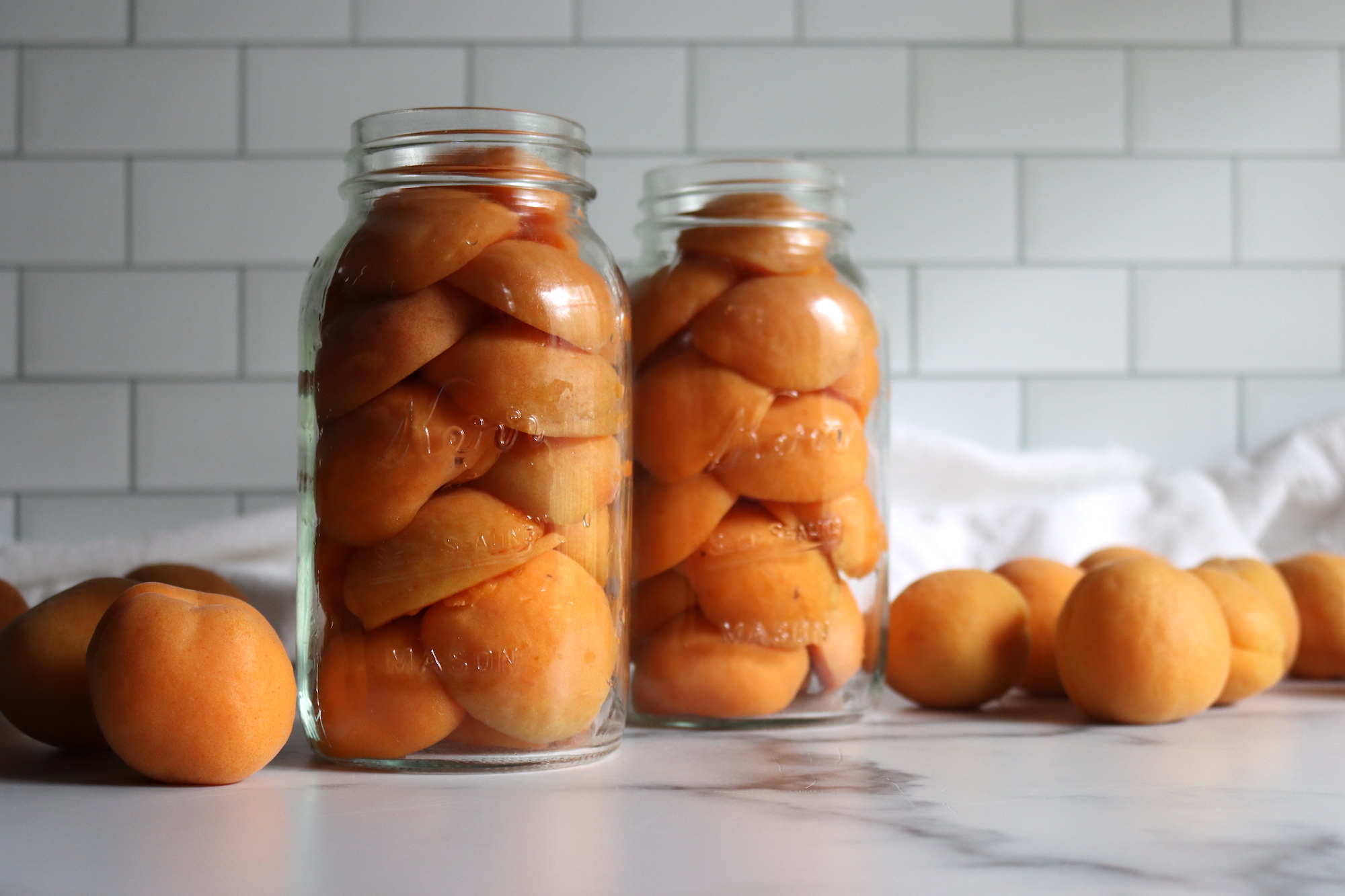
Syrup for Canning Apricots
Apricots can be canned in water, fruit juice, or syrup, but most people prefer to can them in syrup to help preserve their flavor and texture. I recommend using a light syrup for apricots, as it complements their natural sweetness without making them overly sugary.
For a 9-Pint Canner Batch, you’ll need the following amounts of sugar and water for these syrup types:
- Extra-light syrup: 3/4 cups sugar to 6 1/2 cups water
- Light syrup: 1 1/2 cups sugar to 5 3/4 cups water
- Medium syrup: 2 1/4 cups sugar to 5 1/4 cups water
- Heavy syrup: 3 1/4 cups sugar to 5 cups water
- Extra-Heavy Syrup: 4 1/4 cups sugar to 4 1/4 cups water
For a 7-Quart Canner Batch, you’ll need the ollowing amounts of sugar and water for these syrup types:
- Extra-light syrup: 1 1/4 cups sugar to 10 1/2 cups water
- Light syrup: 2 1/4 cups sugar to 9 cups water
- Medium syrup: 3 3/4 cups sugar to 8 1/4 cups water
- Heavy syrup: 5 1/4 cups sugar to 7 3/4 cups water
- Extra-Heavy Syrup: 6 3/4 cups sugar to 6 1/2 cups water
Each pint will need about ½ to ¾ cup of syrup, roughly. The total amount depends on how well you pack the jars.
If you’re canning in quarts, you’ll need about 1 cup to 1 ½ cups of syrup.
Any type of syrup will work, so adjust the sweetness to your tastes.
Canning Apricots
Once you’ve made the syrup and prepared the apricots, it’s time to prepare jars, rings, lids and preheat the canner. For raw pack, the canner should be preheated to around 140 to 150 F. That’s warm, but well below simmering. Too much hotter and you run the risk of thermally shocking your jars.
(If you’re doing hot pack, which I don’t recommend, you want it at a simmer around 180 to 190 F.)
Once the apricots are prepared and the canner is pre-heated, it’s time to pack them into your sterilized jars. If you’re halving the apricots, you can pack them in tightly, but leave some space to ensure that the syrup fully covers the fruit. For a raw pack, simply add the apricot halves to the jars and pour boiling syrup over them, leaving about 1/2 inch of headspace.
For a hot pack, bring the syrup to a boil and simmer the apricots for 2-3 minutes before packing them into the jars. The fruit will soften substantially in a hot pack, and it’s hard to neatly pack them into jars.
After packing the apricots and syrup into jars, use a clean cloth to wipe the rims of the jars to remove any syrup or fruit residue. This ensures a good seal. Place the sterilized lids on top of the jars and screw the bands on until they’re fingertip tight (don’t over-tighten).
Now it’s time to process the jars to seal them properly. You can either water bath can or pressure can your apricots.
- Water bath canning: Process jars of raw packed apricots in a boiling water bath for 25 minutes for pints and 30 minutes for quarts. For hot-packed jars, process for 20 minutes for pints and 25 minutes for quarts. (Adjust for altitude as needed if over 1,000 feet in elevation.)
- Pressure canning: If you’re using a pressure canner, process jars for 10 minutes at 6 lbs pressure in a dial-gauge canner or 5 lbs pressure in a weighted-gauge canner (regardless of whether you used a hot or raw pack).
Be sure to adjust the canning times to altitude if you’re above 1,000 feet in elevation.
After processing, carefully remove the jars from the water bath or pressure canner using a jar lifter. Let the jars cool on a clean towel at room temperature for 12-24 hours. After cooling, check the seals by pressing on the center of each lid. If the lid doesn’t pop back, it has sealed properly. Label your jars with the date and store them in a cool, dark place.
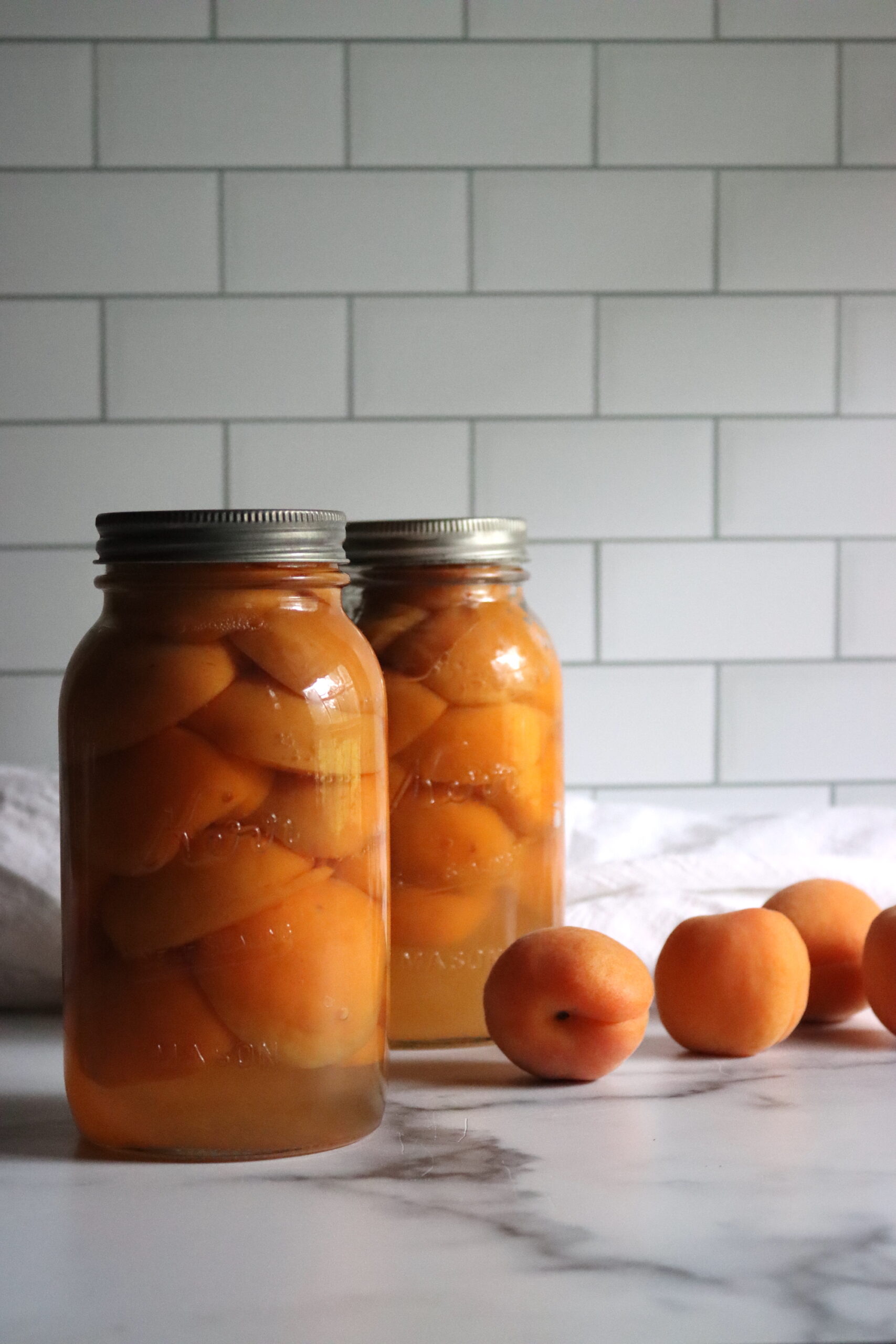
Altitude Adjustments
The altitude adjustments for canning apricots are as follows:
For Raw Pack Waterbath Canning Apricots:
- For 0 to 1,000 feet in elevation: 25 minutes for pints and 30 minutes for quarts.
- For 1,001 to 3,000 feet in elevation: 30 minutes for pints and 35 minutes for quarts.
- For 3,001 to 6,000 feet in elevation: 35 minutes for pints and 40 minutes for quarts.
- For 6,001 and above: 40 minutes for pints and 45 minutes for quarts.
For Hot Pack Waterbath Canning Apricots:
- For 0 to 1,000 feet in elevation: 20 minutes for pints and 25 minutes for quarts.
- For 1,001 to 3,000 feet in elevation: 25 minutes for pints and 30 minutes for quarts.
- For 3,001 to 6,000 feet in elevation: 30 minutes for pints and 35 minutes for quarts.
- For 6,001 and above: 35 minutes for pints and 40 minutes for quarts.
For Pressure Canning Apricots, the times are always 10 minutes, for both pints and quarts, and for both hot and raw pack. The pressure changes with altitude.
With a dial gauge canner such as a Presto, the pressures are as follows:
- For 0 to 2,000 feet in elevation: 6 pounds
- For 2,001 to 4,000 feet in elevation: 7 pounds
- For 4,001 to 6,000 feet in elevation: 8 pounds
- For 6,001 to 8,000 feet in elevation: 9 pounds
- Above 8,000 feet: 10 pounds
With a Weighted gauge canner such as an All-American Brand, the pressures are as follows:
- For 0 to 1,000 feet in elevation: 5 pounds
- Above 1,001 feet in elevation: 10 pounds
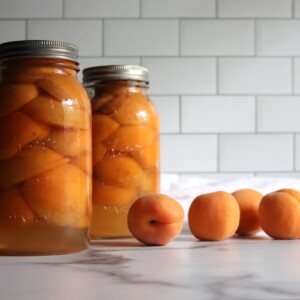
Canning Apricots
Equipment
Ingredients
- Apricots
- Sugar
- Water
Instructions
- Wash, halve, and pit the apricots. Optionally, treat with lemon juice to prevent browning.
- Combine the sugar and water (or juice) in a saucepan (see notes for quantities). Bring to a boil, stirring until the sugar is dissolved.
- Place jars in boiling water for 10 minutes to sterilize. Keep the lids simmering in a separate pot of hot water.
- Pack apricot halves into hot, sterilized jars. Pour warm syrup over the fruit, leaving 1/2 inch of headspace.
- Wipe jar rims, add lids and bands, and tighten the bands until fingertip tight.
- Process in a water bath canner. Times for raw pack are for 25 minutes for pints and 30 minutes for quarts. For hot pack, times are 20 minutes for pints and 35 minutes for quarts. For pressure canning, process for 10 minutes at 6 lbs pressure. Be sure to adjust for altitude, see notes below.
- Let jars cool completely, check seals, and store. Properly canned and sealed jars can be stored on the pantry shelf indefinitely without spoiling, but quality starts to deteriorate after 12-18 months. Refrigerate after opening.
Notes
For a 9-Pint Canner Batch, you’ll need the following amounts of sugar and water for these syrup types:
- Extra-light syrup: 3/4 cups sugar to 6 1/2 cups water
- Light syrup: 1 1/2 cups sugar to 5 3/4 cups water
- Medium syrup: 2 1/4 cups sugar to 5 1/4 cups water
- Heavy syrup: 3 1/4 cups sugar to 5 cups water
- Extra-Heavy Syrup: 4 1/4 cups sugar to 4 1/4 cups water
For a 7-Quart Canner Batch, you’ll need the following amounts of sugar and water for these syrup types:
- Extra-light syrup: 1 1/4 cups sugar to 10 1/2 cups water
- Light syrup: 2 1/4 cups sugar to 9 cups water
- Medium syrup: 3 3/4 cups sugar to 8 1/4 cups water
- Heavy syrup: 5 1/4 cups sugar to 7 3/4 cups water
- Extra-Heavy Syrup: 6 3/4 cups sugar to 6 1/2 cups water
Altitude Adjustments
The altitude adjustments for canning apricots are as follows:For Raw Pack Waterbath Canning Apricots:
- For 0 to 1,000 feet in elevation: 25 minutes for pints and 30 minutes for quarts.
- For 1,001 to 3,000 feet in elevation: 30 minutes for pints and 35 minutes for quarts.
- For 3,001 to 6,000 feet in elevation: 35 minutes for pints and 40 minutes for quarts.
- For 6,001 and above: 40 minutes for pints and 45 minutes for quarts.
For Hot Pack Waterbath Canning Apricots:
- For 0 to 1,000 feet in elevation: 20 minutes for pints and 25 minutes for quarts.
- For 1,001 to 3,000 feet in elevation: 25 minutes for pints and 30 minutes for quarts.
- For 3,001 to 6,000 feet in elevation: 30 minutes for pints and 35 minutes for quarts.
- For 6,001 and above: 35 minutes for pints and 40 minutes for quarts.
With a dial gauge canner such as a Presto, the pressures are as follows:
- For 0 to 2,000 feet in elevation: 6 pounds
- For 2,001 to 4,000 feet in elevation: 7 pounds
- For 4,001 to 6,000 feet in elevation: 8 pounds
- For 6,001 to 8,000 feet in elevation: 9 pounds
- Above 8,000 feet: 10 pounds
With a Weighted gauge canner such as an All American Brand, the pressures are as follows:
- For 0 to 1,000 feet in elevation: 5 pounds
- Above 1,001 feet in elevation: 10 pounds
Nutrition
Nutrition information is automatically calculated, so should only be used as an approximation.
Fruit Canning Recipes
Putting up more than just apricots this season?
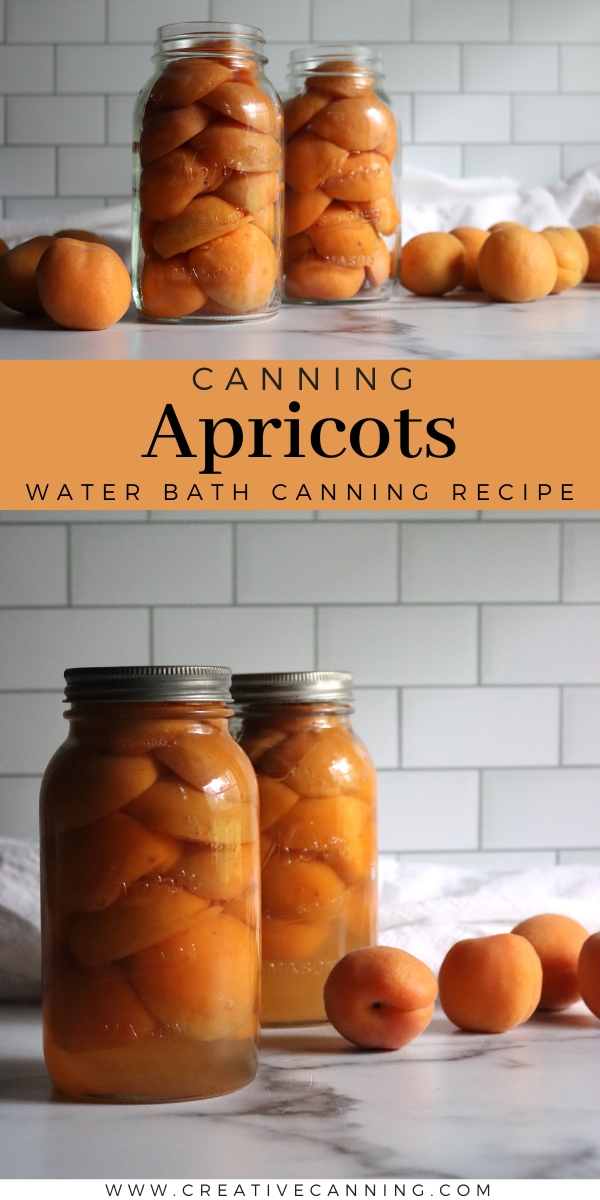
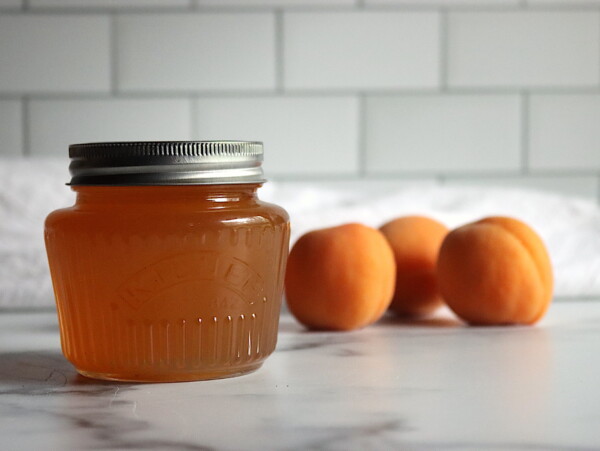
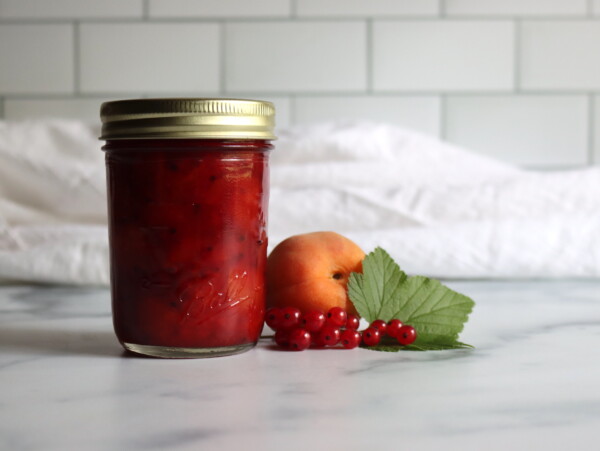
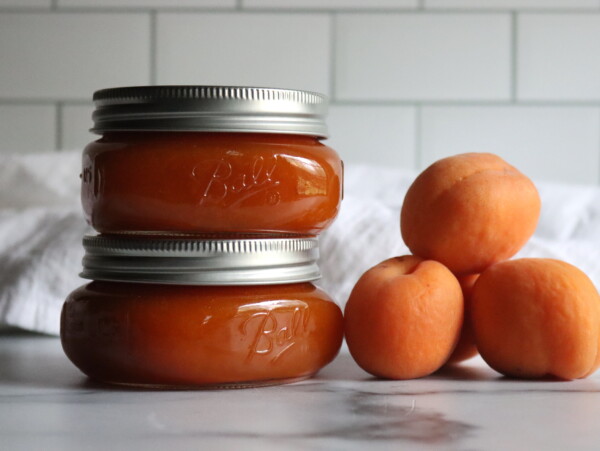
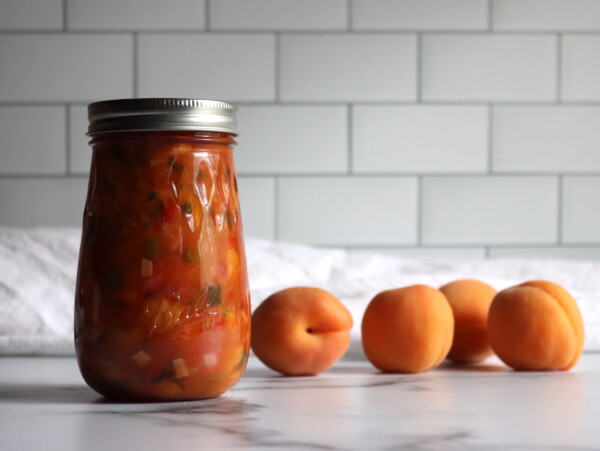
My mom loves this recipe and it’s saved her so much freezer space over the years! She has a crazy productive apricot tree, and she used to keep a chest freezer in the garage just for storing them. Now she can keep them ready to go on the pantry shelf and doesn’t have to worry about power outages!